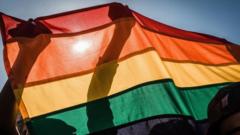The World Bank's decision hinges on a commitment to mitigate potential discrimination against the LGBTQ community. A spokesperson underlined that the institution's mission to eradicate poverty and support sustainable growth can only be achieved by ensuring inclusive participation in funded projects. The organization claims to have collaborated with the Ugandan government to implement anti-discrimination measures as part of its funding strategy.
This new funding will target initiatives in social protection, education, and refugee support, crucial areas in a nation where the World Bank plays a pivotal role in infrastructure development. However, some economists express concern that the World Bank's funding model may perpetuate dependency in low-income countries like Uganda, imposing restrictions that hinder long-term growth.
The reversal of the ban comes amid significant international backlash against Uganda's Anti-Homosexuality Act, which has reportedly cost the country between $470 million and $1.7 billion due to halted financing from various global entities. Critics argue that the Ugandan government's stance against LGBTQ rights serves as a distraction from pressing issues like high unemployment and political repression.
Human rights advocates highlight the dangers posed by the law, which has incited violence among citizens against perceived LGBTQ individuals and has eroded protections for those defending homosexual rights.
This significant policy change raises questions about the balance between external financial support and adherence to human rights, a debate that continues to evolve in the wake of Uganda's controversial legislation.
This new funding will target initiatives in social protection, education, and refugee support, crucial areas in a nation where the World Bank plays a pivotal role in infrastructure development. However, some economists express concern that the World Bank's funding model may perpetuate dependency in low-income countries like Uganda, imposing restrictions that hinder long-term growth.
The reversal of the ban comes amid significant international backlash against Uganda's Anti-Homosexuality Act, which has reportedly cost the country between $470 million and $1.7 billion due to halted financing from various global entities. Critics argue that the Ugandan government's stance against LGBTQ rights serves as a distraction from pressing issues like high unemployment and political repression.
Human rights advocates highlight the dangers posed by the law, which has incited violence among citizens against perceived LGBTQ individuals and has eroded protections for those defending homosexual rights.
This significant policy change raises questions about the balance between external financial support and adherence to human rights, a debate that continues to evolve in the wake of Uganda's controversial legislation.




















